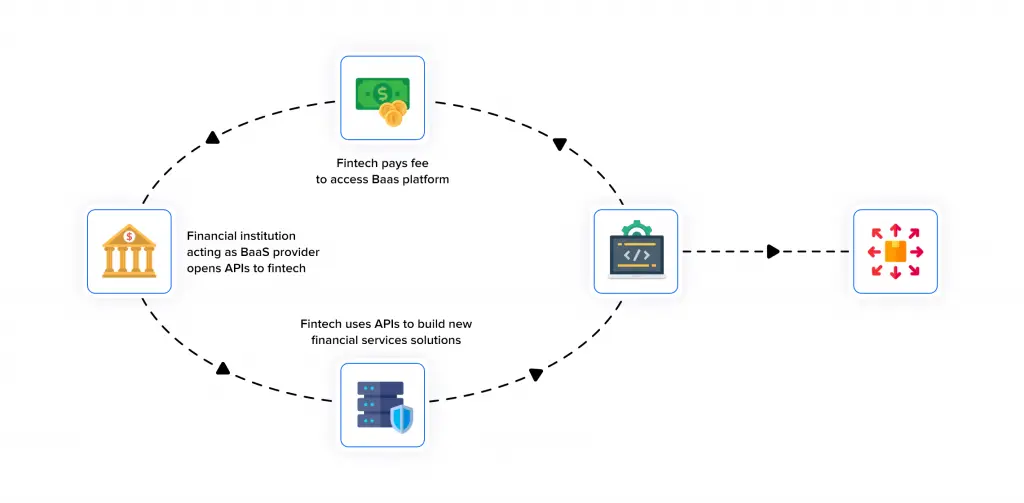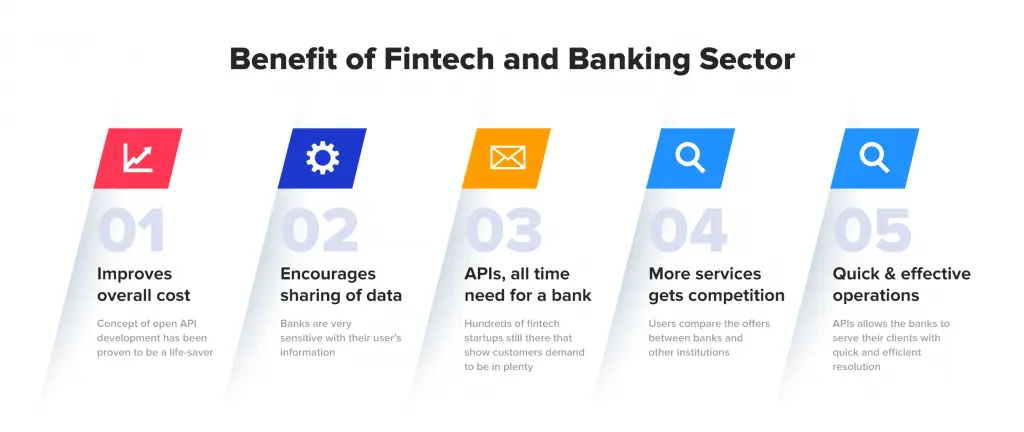Ultimate Guide on Fintech API and Banking API 2026

In a financial ecosystem, both Banking APIs and Fintech APIs enable banks and finance-based organizations to add modern, technological features that enhance custom services to their users via their apps.
For years, when the global banking sector was dealing with complexities in operations – it was fintech companies that reframed the entire scenario with modern technologies. Yes, they used APIs to make a way for banks and other financial institutions.
These APIs get fixed into any third-party application creating a series of services letting the user’s financial data more accessible. They have also inspired the Financial Technology (FinTech) companies to serve the financial sector in many ways with transparency in services for the account holder.
Well, all these sound cool right – But I know this might interest you to know more about them.
So, with no delay let’s get started!
Table of Contents
What is API in Banking?
Banking APIs are a set of protocols that enable secure communication between your bank’s server and the client devices. It helps the customers communicate with banking personnels via the bank’s app, just with an internet connection.
Since the entire interaction involves conversations and data transfer related to money, the banking APIs will require strict authentication and security encryptions.

If we talk about the backend, these APIs connect the developers to the payment networks to display billing details. This in turn gets them converted into a necessary tool when it comes to BaaS (Bank as a services).
What is Fintech API?
Fintech APIs are interfaces that help apps communicate with the corresponding finance-related data and services available in the servers of an organization/company/banks.
For example, The Banking APIs mentioned above in this article is a type of Fintech API. When a Banking API is integrated into an app, the account holder can access all the information related to his bank account, make transactions and avail services like loans, bill payments, etc. For each feature, the API consists of separate functional modules. These modules help the app communicate with the bank’s server to help customers access online banking services.
Well, where the above data about the notion of APIs in both the fintech and banking sector would have gotten you some understanding of the concept, now let’s see how these APIs benefit them in further run.
How Fintech API and Banking API Works?
Following are the stages of the fintech or banking APIs when integrated into any existing or new apps:
- A developer signs up for an account with an Fintech API Provider
- The developer acquires the API Key from the Provider
- The developer starts making APIs requests to the provider’s server. The request may include: checking account balance, transaction history, money transfers, or any.
- The server starts processing the request
- On completion, it reverts back with a response to the app. The response may include: account balance statement, transaction details, transfer of money or any.
This is the lifecycle of an API to provide services related to banking and fintech.
Benefits of Fintech API and Banking API
If you look around, you can see that every other industry directly or indirectly makes use of banks and their APIs.
So, let’s have a check with some of the benefits that they avail using them,

1. Improves The Overall Cost
When it comes to numerous banking services, the concept of open API development has been proven to be a life-saver. Yes, integrating them into a variety of applications lets you track every crucial information about the transaction and also with related issues of the bank’s website to have a check on.
2. Encourages Sharing Of Data For Better User Experience
Banks are very sensitive with their user’s account information and a lot more conscious when it is about sharing their customer’s data. With digital banking API integration, now the users get full control over their data. Henceforth, the customers can demand the banks to enable sharing of their data with any desired third-party provider.
3. APIs, All Time Need For A Bank
As everybody is looking out for fintech app development, there are very few chances for APIs in the banking industry to be outdated. As a result, there are hundreds of fintech startups still there that show customers demand to be in plenty. Even when it is about businesses, these APIs or application programming interfaces in banking offer more services.
4. More Services Gets More Competition
Where the usage of APIs have benefited the users it has also increased the competition in the market. This in turn increases the pricing in the financial industry. For instance, the users start using the financial services to compare the offers between banks and other institutions.
5. Quick And Effective Operations
The methodology of these APIs allows the banks to serve their clients with quick and efficient resolution. These APIs let the clients manage the banking transactions via mobile, online or wallet services across the devices – which prohibits clients from having a visit to the banks to make any transactions.
Now, let’s get some ideas using the use cases.
What About Banking Use Cases In The Fintech Sector?
The open banking use cases tend to be limited with one’s imagination. At first the revolution started inside the financial market, wherein the later stages, it has moved into a prime, mainly for startups and developers to create new tools.
At an early stage the use cases that dealt with lending and credit markets were only being considered for banking and the rest were not in use until they planned to expand its reach to other sectors. This includes personal finance, insurance, payment methods and related fields. Let’s have a look some of the benefits that different industries are getting,
1. Price Comparison Websites To Track Users Info
The websites like MoneySuperMarket perform an analysis to compare prices embracing the APIs in the fintech economy, in order to become a direct online distributor of financial products. Here, these websites create API service layers to empower the sites and let them have commercial partnerships to grow.
2. Currency Exchange Among Industries Using Peer-To-Peer
Today there are thousands of P2P payment apps offered by financial institutions with several services. However, with APIs in fintech like TransferWise app, you can eliminate the intermediaries in the process making the provider independent.
3. Lending Via Peer-To-Peer Among The Industries
With lending, these P2P platforms support connecting lenders and borrowers with each other avoiding the need of any intermediaries. One among many popular platforms is LendingClub where the APIs are used to search, perform orders, monitor loans, configure the lending portfolios as an investment, and more.
4. Investment Management Across The Industry
Previously, it was a challenge for the financial advisors to get client’s information in order to provide optimized services. But, today the investment management APIs provide a way to portfolio information of individual clients by eradicating the need to make a guess on their client’s assets and net worth from several sources.
5. Develop The Ventures Of Open Banking
Most of the banking related organizations like ING are entertaining the concept of launching many independent ventures. They all focus on creating new products with the help of APIs integration. The three products that these organizations look for – a personal finance management aggregator, financial service aggregator, and payconiq digital wallet.
Beside this they also use the API-based developer portal to get connected with external developers.
6. Payment Process Across The Industry
Need of APIs for payment processing is compulsory when it comes to businesses and merchants for a smooth transaction. Here, the APIs not only facilitates the payment process but also maintains and streamlines the check-out process while performing any online purchases.
7. Gets You White Label Services Never Compiling The Need To Build
If you check out the market, you can find many APIs including white-label APIs if ever planning to build your brand. Therefore, these APIs move well along with its use in banks and other fintech sectors. They allow the banks and other fintech companies to avail their benefits without the need to develop their own platform and programs.
8. Gaming World With APIs
If you check out the market, you can find many APIs including white-label APIs if ever planning to build your brand. Therefore, these APIs move well along with its use in banks and other fintech sectors. They allow the banks and other fintech app development companies to avail their benefits without the need to develop their own platform and programs.
Recommended Reading
Where the above section explains the benefits the use cases are having with APIs, What could be their future with fintech and banks?
Best Fintech API and Banking API Providers In 2026
We have compared the top APIs you might find useful for integration into your banking apps or platforms.
Here some of the best Fintech and Banking APIs are Stripe, Plaid, and Bitquery for your Android, iOS, and Web Apps. choose your payment API based on their types, features and pricing plans.
1. Stripe
Type: Payment API
This online payment API is the most flexible and safest method of processing funds via different fund transfer methods.
For example, when a customer is shopping online, the payment process takes him/ her to a gateway where he/she can choose to pay the seller via a credit card/ debit card/ UPI or Net Banking. Stripe is an intermediary which connects the customer’s bank account to the seller’s bank account, for fund transfer in any form.
Key Features
- Facilitates Recurring Payment Processes
- Generates Invoices
- Supports almost 150 currencies
- Uses machine learning tools to prevent frauds
- Allows third-party integrations
Pricing Plans
- Pay-as-you-go plans
- Enterprise plans
2. Plaid
Type: Authentication and Banking Integration
Plaid, is a banking information aggregator that provides fintech solutions to customers, sellers, banking personnels and other stakeholders. This banking API works as explained below:
To process a transaction, users may have to provide details like names, addresses, location and other account related information on a merchant’s website. On the vendor’s side, an interface must validate the user, authenticate the information, process transactions and save the details securely for future purchases.
Key Features
- Authenticating bank accounts
- Transaction History
- Validation of user income
- Location tracking at the time of transaction
- Fraud prevention
Pricing Plans
- Scale: Costs $500/month
- Launch: Pay-as-you-go pricing
3. Bitquery
Type: Cryptocurrency / Blockchain API
Bitquery uses the GraphQL technology to access data from over 40 blockchains. This API indexes all the data in the blockchain, allows customization of the data set you need and retrieves them using a single GraphQL endpoint.
Key Features
- Money Source Tracking
- Transaction History
- Retrieving blockchain technology data
- Detects stolen funds
- Fraud prevention
Pricing Plans
Offers 5 different packages
- Developer
- Team
- Startup
- Growth
- Business
- Enterprise
4. Polygon’s Stock Trading APIs
Type: Stock API
Polygon is a trading platform that offers stock APIs and allows access to stock market data. Thereby, fintech developers and data analysts can make use of these information to build custom stock market apps for their users.
Key Features
- Quotes of real-time stock
- Stock histories
- Streaming of real-time market data
- Order management
- Market Insights and Updates
Pricing Plans
Polygon offer 4 different packages for its Stock APIs:
- Basic: Free
- Starter: $29 /month
- Developer: $79 /month
- Advanced: $200 /month
5. Pinwheel
Type: Payroll Integration APIs
Pinwheel is a Consumer Reporting Agency (CRA) that is popularly known for accessing customer income data and updating their direct deposits. These API are used to connect the payroll of an employee to an app, HR tools. This ensures that the employee income is automatically processed and streamlined, eliminating manual deposits and risk of errors.
Key Features
- Direct deposit switching
- Customer income data
- Tax form assessment
- Loan verification
- Fraud mitigation
Pricing Plans
- No information available in the website, might need to contact the team for more details.
What’s The Future Of The Fintech And Banking Sector With APIs?
Once witnessing the present scenario and the usage of banking APIs, the future seems to be promising with businesses and larger communities. But of course, they will have a better outcome for tomorrow.
This is so as these banking APIs do connect with e-commerce websites to facilitate online shopping on one hand. On the other hand, they also support the customers to have a check on their bank account instantly to plan the shopping to make payment. Sometimes, they do offer support for lending payments too while shopping using the lending API option at POS locations.
According to the Mckinsey study on APIs in 2020, the banks are expected to triple the usage of APIs by 2025.
Wrapping Up!
Finally, we’ve come to the end of this post, and I hope this article gave you a deeper understanding about how fintech and banking APIs work and the list of best providers in the market.
With MirrorFly, you can build your banking apps with highly scalable video, voice and chat features. We offer both cloud and self-hosted solutions, so that you can flexibly choose the pricing model that best fits your needs.
Need customizable SDKs for your banking apps? We’ve got them! Explore our self-hosted solution and avail a full range of video, voice and chat features for a one-time license cost!
Drive 1+ billions of conversations on your apps with highly secure 250+ real-time Communication Features.
Contact Sales200+ Happy Clients
Topic-based Chat
Multi-tenancy Support

Related Articles
- How to Build A Flutter Video Call App in 2026?
- How to Build a React JS Video Chat App in 2026?
- How to Build an Android Voice and Video Calling App Using Java?
- Communication APIs: Top 7 In-app Chat, Voice & Video APIs
- WebRTC Video Call API: The Definitive Guide
A good content. I am doing some research on digital banking api . I am learning the benefits, use cases what features people need, what people don’t and so on.Thanks for putting this together.
Hi Sanjay, thanks for taking the time to read my article. In case you wish to build an exceptional banking chat app, your best choice could be MirrorFly. Because of its twin pricing model – “Pay-as-you-go” and “Self-hosted model”, where the former offers features on a monthly subscription, and the latter is based on a one-time license cost.
Thanks. I found a few good ideas in your article and choosing best fintech api providers for my business.
Hi Abilash, thanks for your feedback, and glad that you found the right fintech API provider for your business.
Great Content! Totally agree that fintech and banking api are highly beneficial nowadays. Thanks for sharing useful content.
Thanks, Sitlani for your feedback on my article. My best wishes to you.
Useful info on how fintech api and banking api works. I learned more details from this post of digital banking api usecases, features etc.
Hi Kiran, thanks for your response, and keep coming back for more insights on in-app communication features.
Really great article, which has lots of good information, when someone is in search of Fintech api and use cases of banking api.
Hello, Nelson, thanks for your feedback on my article. Best of luck to you!
Hey Really happy to say, your post is very interesting to read about fintech and digital banking api. You’re doing a great job.
Hello Stevenson, thanks for your feedback on my article. My best wishes to you.
Very Informative blog! Thank You guys, the article is really helpful. It taught me the complete details of api in banking industry. Thank You for sharing your insights.
Thanks, Nick for your positive feedback, and very delighted to know that my article was able to help you gain insight into fintech APIs.
Interesting Article! Thanks for the sharing I am also looking the digital banking api information. I will pin your post. Thanks
Good to hear from you, Faizal! Glad to know that you are looking for banking chat apps. If you are interested to build one, you can go ahead with MirrorFly’s SDKs that helps you to add feature-rich messaging features.
Great article. As I would see it, extraordinary explained about banking api and fintech api, you make everything so easy to understand. Thank you so much. You speak to the very experienced and the professional.
Thanks, Nilan for your valuable feedback on my article. Keep reading other blogs for more insight on in-app communication features. Have a great day!
Thanks for the post. This was very helpful to know the fintech and banking api technology.
Hello Peter, very grateful for your response! Keep coming back for more insights on video calling SDK features and benefits. My best wishes to you.